In this interview series we let our members take the spotlight! Today, we are talking to Chrissie, an Australian expat in Ghana. She joined her husband in West Africa about one and half years ago and blogs about her Ghanaian adventure on Six Degrees North.
1. Please tell us a little bit about yourself. Who you are, where you come from, when you moved to Ghana, etc.
My children and I moved to Ghana almost 18 months ago from Newcastle, a great seaside city in Australia. Prior to this, my husband had been working in Ghana for almost a year on a fly-in fly-out roster – which is really hard on family life!
So when we were offered the opportunity to live in Ghana, we thought it would be a good adventure for us all. We now split our time between Kumasi, the second largest city of Ghana, and a town about an hour and a half away called Konongo, where my husband works. The children attend school in Kumasi.
2. When and why did you decide to start blogging about your experiences?
I actually started blogging just as we were leaving Australia to move to Ghana. 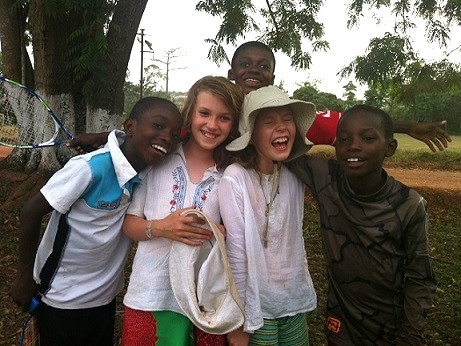 It was at the suggestion of friends that I began to blog. I was never comfortable with the mass emails to friends and family, and by starting a blog, I gave them an opportunity to see what we have been up to. What has been really great is that the blog’s audience has really grown, and I’ve been able to connect with people around the world, and made some good friends here in Ghana through the blog, too.
It was at the suggestion of friends that I began to blog. I was never comfortable with the mass emails to friends and family, and by starting a blog, I gave them an opportunity to see what we have been up to. What has been really great is that the blog’s audience has really grown, and I’ve been able to connect with people around the world, and made some good friends here in Ghana through the blog, too.
3. Do you have any favorite blog entries of yours?
It’s funny to look back over the blog entries and see how we have changed, and how Ghana has changed us, over the past 18 months. But if I had to pick a favorite it would be our True Stories series, where we chronicle the mini-disasters we’ve had, trying to settle into a new culture. My husband wrote the first one. And I wrote Parts II and III.
4. Tell us about the ways your new life in Ghana differs from that back home. Did you have trouble getting used to the new circumstances? Did you experience culture shock?
Culture shock was very real, and I had underestimated how profound it could be. I think it was particularly exacerbated by the fact that, for the first year in Ghana, we lived quite an isolated life on the mining site where my husband works.
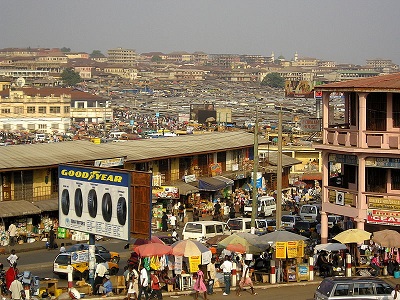 As to differences in our lives, we moved from an affluent regional city, where we could walk almost everywhere, to a developing-world city; general logistics are just a lot harder here as there are nowhere near as many services in Kumasi, like grocery shopping or getting the car fixed. Due to the local traffic everything here just takes a lot longer, and it rarely goes right the first time! It’s also hot all year round: it takes a while to get used to, but it also means it’s always warm enough for a swim!
As to differences in our lives, we moved from an affluent regional city, where we could walk almost everywhere, to a developing-world city; general logistics are just a lot harder here as there are nowhere near as many services in Kumasi, like grocery shopping or getting the car fixed. Due to the local traffic everything here just takes a lot longer, and it rarely goes right the first time! It’s also hot all year round: it takes a while to get used to, but it also means it’s always warm enough for a swim!
Living in Ghana has also made me realize what a secular and casual society Australia is. Politeness, taking time to greet people properly, and to slow down have all been excellent lessons from living in Ghana. It has also been interesting to live in a much more traditional and religious society, and as a relaxed Australian, I have made plenty of social gaffs adjusting to a new culture.
One of the best parts of our move is that in leaving friends and family behind, we have become so much closer as a family, which has been, of course, lovely.
5. Do you think you were fully prepared for what awaited you in Ghana? If you could, would you change some decisions/preparations you made?
While we had done as much preparation as possible, I don’t think we were fully prepared for what we faced, but I don’t think it would be possible to be so. I even had visited Ghana before we moved, but there is nothing like actually living in a new location, particularly one as different from Australia as Ghana. 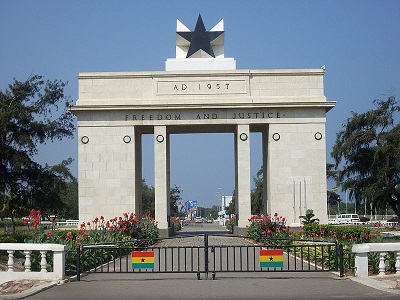
While you can mentally prepare for things like malaria and such, it’s difficult to prepare yourself for the reality of living in a developing country. You’ll just need to deal with frustrations like, negotiating traffic, daily life, time management, thrown in with living in a culture which is far more traditional (and different) to what we had come from.
6. Every expat knows that expat life comes with some hilarious anecdotes and funny experiences. Care to share one with us?
I guess the coolest thing we’ve experienced came very early after our move to Ghana; we were invited to a farewell party at the mine for one of the senior managers, who was being enthroned as a chief of community.
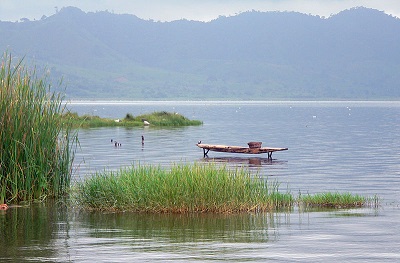 There are 18 local chiefs and they all came with their entourages dressed in traditional West African robes, with velvet hats and masses of gold jewelry. There were hundreds of people, and loud music. We were just overcome with the color and noise and people; it seemed so truly exotic and quintessentially West African. Not a funny story, but a really awesome introduction to Ghana.
There are 18 local chiefs and they all came with their entourages dressed in traditional West African robes, with velvet hats and masses of gold jewelry. There were hundreds of people, and loud music. We were just overcome with the color and noise and people; it seemed so truly exotic and quintessentially West African. Not a funny story, but a really awesome introduction to Ghana.
7. Which three tips would you like to give future expats before they embark on their new life in Ghana?
Firstly, to be patient and take things slowly! At the beginning we expected to get as much done in a day as we could in Australia, and it’s just not possible. It can lead to so a lot of frustration. While Ghana may be on GMT, it certainly stands for Ghana Maybe Time, and not so much for Greenwich.
Secondly, be prepared to be treated differently because you are a foreigner. If you are not African, you will hear constant calls of ‘Obruni!’, which means ‘White man’. Ghana is not a wealthy country, and being a foreigner instantly means you are wealthy by the majority of Ghanaian standards. It’s a balance between being taken advantage of, and being able to make a genuine contribution to the community.
Thirdly, get out there and enjoy Ghana! Ghanaians pride themselves on their peaceful, polite, democratic country. People are generally very friendly, and a smile and genuine greeting goes a long way. There is always plenty to look at in the streets and markets of Ghana; it’s a busy, colorful, slightly chaotic place; very different to the Western world.
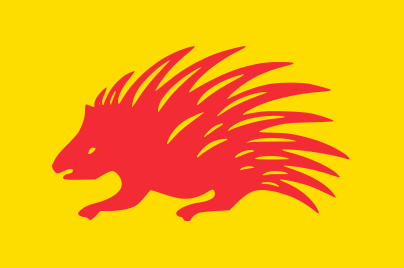 8. How is the expat community in Ghana? Did you have a hard time finding like-minded people or fellow expats?
8. How is the expat community in Ghana? Did you have a hard time finding like-minded people or fellow expats?
In the capital, Accra, there are a lot of expats and expat-centered activities. In Kumasi (the second largest city, where our children go to school) there are far fewer expats, and many of those are long-term expats; some are third generation! So, the expat community up here in Kumasi, while small, is pretty close knit.
I guess it’s true with being an expat anywhere, that you really need to put yourself out there to meet people. Kumasi doesn’t have a lot of expat activities, so play golf, play tennis, swim at the hotel pools, or even start a blog. Eventually you start to meet people. Accept all invitations because you never know who you will meet.
My blog and sites like InterNations have been excellent in helping us set up connections which have lead to lasting friendships.
9. How would you summarize your expat life in Ghana in a single, catchy sentence?
Family of five finds a life less ordinary, amidst the chaos, color and heat of Ghana.
(Photo credit: 1) Chrissie G.-R. 2) Kumasi Market by Wikimedia Commons user Lattitude Canada 3) Independence Arch, Accra by Wikimedia Commons user George Appiah 4) Lake Bosumtwi, near Kumasi by Wikimedia Commons user Stig Nygaard 5) Flag of the Ashanti Empire by Wikimedia Commons user Zuanzuanfuwa – the porcupine is also the mascot of Kumasi’s popular football team FC Asante Kotoko)
I am moving to Ghana mid-year after my Ghanaian fiancée visits me first for three months to meet my family, and to experience Australian Culture. I have been to Kenya four times, and seemed to slot in okay there because I was so laid back. From what you say of your experience you did the right thing by trying to blend in with the local culture over time. I worked with Australian Aborigines in remote Australia for the last thirty years, and initially there was culture shock, no supermarkets except in Alice Springs some 430k away, but we just mixed with the locals as soon as we could, and were accepted.
Do you envisage any problems with my settling into life in Berekum? I am used to the heat after working in the East Kimberleys for the last 30 years.
Chris
Hi Christopher,
Thanks for commenting! Unfortunately, this is a fairly old article, so I don’t think our guest blogger/interviewee is going to find your feedback and questions. Maybe you’d better try contacting her directly via her own blog:
http://sixdegreesnorth.me/
Best,
Margit (the blog moderator)
Thanks for your lovely comment Anne. I totally agree with you when you say its all in the mind. We have a mantra “Manage your expectations”, it’s all about how you choose to respond to situations. Thanks again, Chrissie
Loved reading about your experience and reflecting in my own memories
Hi Chrissie,
Nice to meet you here 🙂
I went through your experience mentioned here twice and both the times I enjoyed myself as it seemed I was traveling along with you from Australia to Ghana!
I can well imagine how the transition must have been and it’s surely not easy for the kids – they take a lot of time adjusting to new surroundings too. But at the end of the day, you can make any place paradise IF you want to – isn’t it?
I loved your ending lines – Family of five finds a life less ordinary, amidst the chaos, color and heat of Ghana. – couldn’t have said it better 🙂
I do hope you enjoy your stay there and yes, they say it all lies in the mind. So, if we make up our minds to stay happy, we will.
Thanks for sharing more about your experiences with us – it was truly wonderful to read all about it 🙂